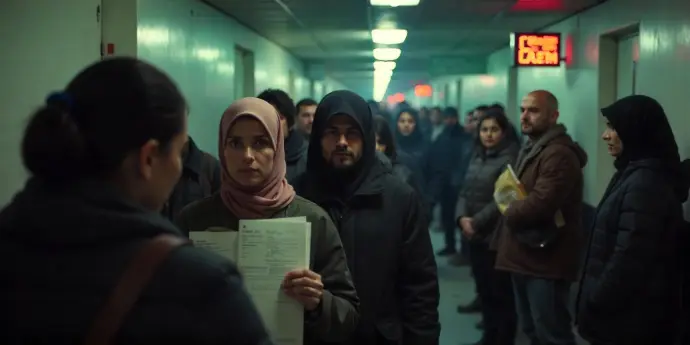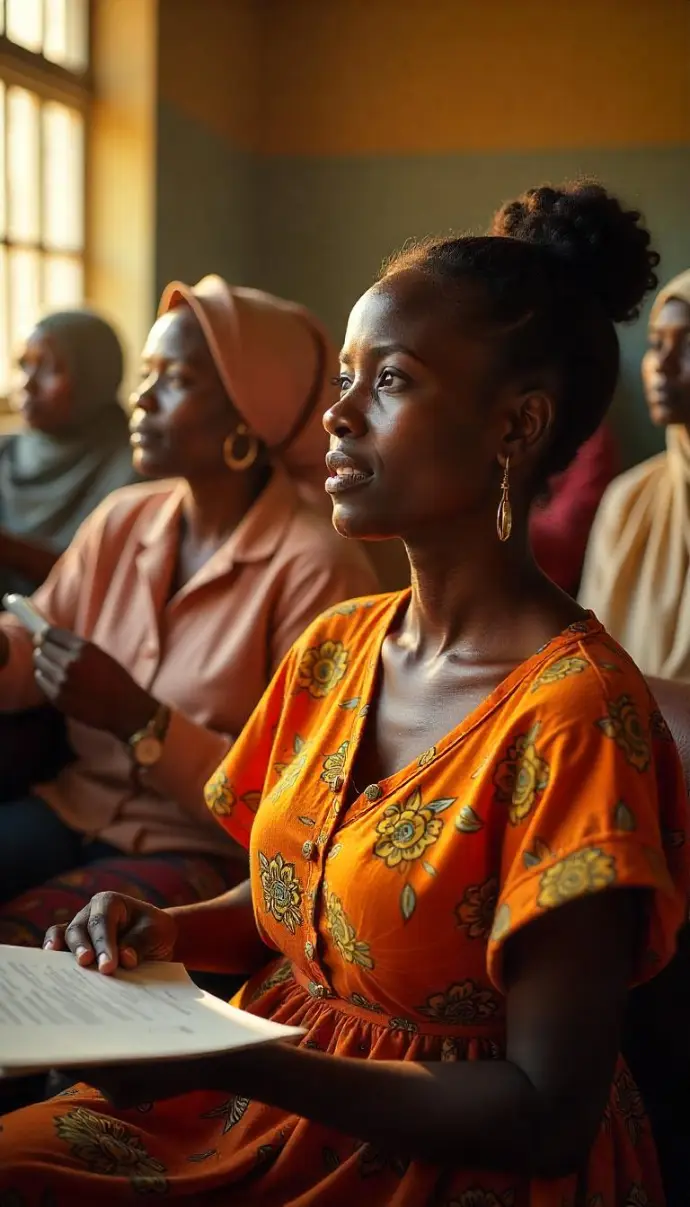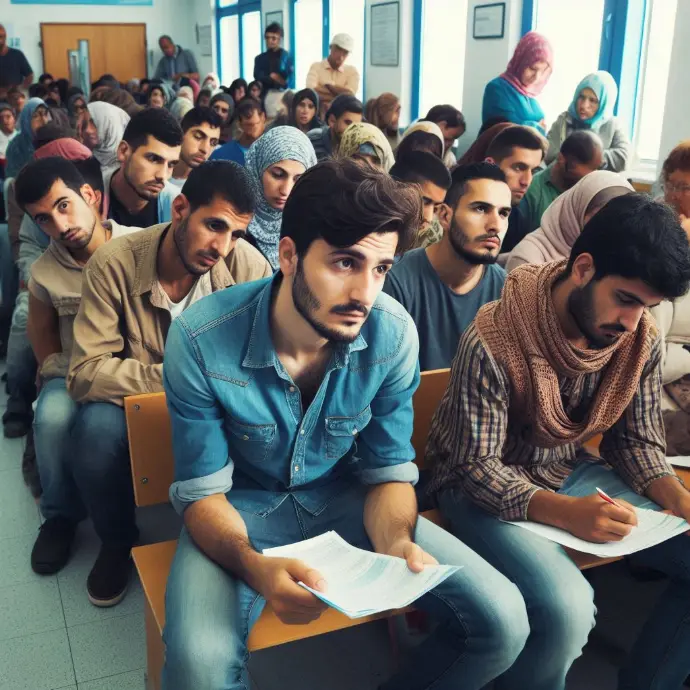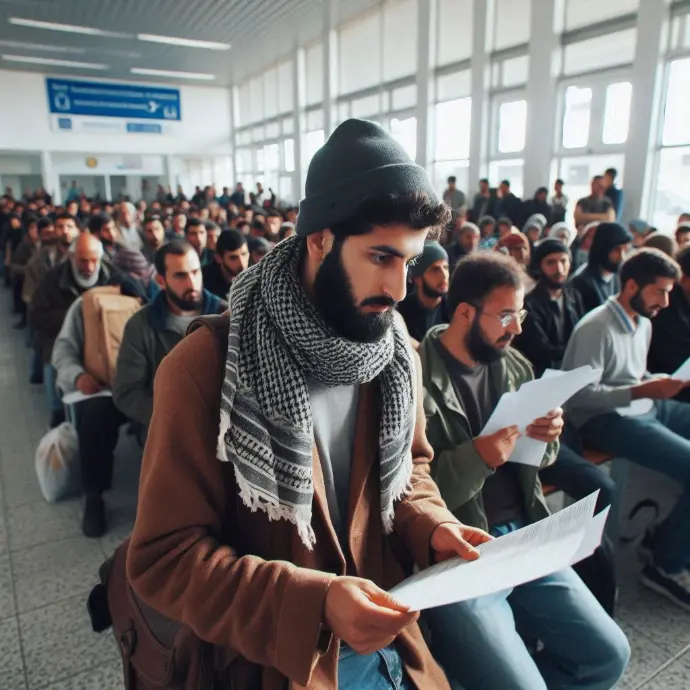The Challenge of Resettlement:
Policies and Practices for a New Life
In our latest article, "The Challenge of Resettlement: Policies and Practices for a New Life," we explored resettlement policies for human rights in depth. Join us on this journey of discovery and information, where the complexity of rights in armed conflict is thoroughly analyzed. Prepare to delve into a world of debate and research that will challenge your perspective!




Introduction
The resettlement of refugees and displaced persons is a challenge facing many nations today. This process involves the relocation of people who have fled their countries of origin due to armed conflict, persecution, or human rights violations. The goal is to provide them with the opportunity to start a new life in a safe and welcoming place. However, resettlement policies and practices play a crucial role in ensuring that the human rights of these people are respected and protected.
The resettlement of refugees and displaced persons is a complex process that involves coordination between governments, international organizations, and NGOs. There are logistical, legal, and social challenges that must be addressed to ensure the resettlement process is effective and respectful of human rights.
People in need of resettlement have often experienced significant trauma, and it is critical that they receive appropriate support to overcome these experiences. Furthermore, integration into the host society can present challenges in terms of language, culture, and employment. Therefore, it is essential that resettlement policies take these complexities into account and provide the necessary support.
The challenge of resettlement also lies in the capacity of receiving countries to manage the increase in population and the resources needed to support the integration of refugees and displaced persons. This requires careful planning and effective cooperation among all parties involved in the process.
Resettlement policies play a fundamental role in protecting the human rights of refugees and displaced persons. These policies must ensure that the principle of non-refoulement is respected, meaning that people are not sent back to situations where their lives or freedoms are at risk. Furthermore, resettlement policies must ensure protection against discrimination and that fundamental rights, such as access to education, healthcare, and employment, are respected.
A human rights-based approach to resettlement policies involves considering the specific needs of vulnerable groups, such as women, children, and people with disabilities. These policies must also address the barriers that refugees and displaced persons may face in accessing justice and legal documentation.
Furthermore, resettlement policies must encourage the active participation of refugees and displaced persons in the decision-making processes that affect their lives. This entails listening to their voices, respecting their opinions, and ensuring that they have the opportunity to contribute to the creation of policies that will directly affect them.
In the current situation, the resettlement of refugees and displaced persons faces significant challenges due to the COVID-19 pandemic and changes in immigration policies in various parts of the world. Reduced resettlement quotas, increased travel restrictions, and tightened border policies have impacted displaced persons' ability to find a safe place to resettle.
Furthermore, anti-immigrant rhetoric and discriminatory policies have created a climate of hostility toward refugees and displaced persons in some regions, hindering their integration and putting their human rights at risk. It is essential to conduct an in-depth analysis of these challenges and work collaboratively to develop resettlement policies that are effective, respectful of human rights, and address the evolving needs of displaced persons.
The challenge of resettling refugees and displaced persons requires a comprehensive approach that considers logistical, legal, social, and human rights aspects. Resettlement policies play a crucial role in this process, and it is essential that they be developed and implemented in a way that ensures the protection and respect of the human rights of displaced persons.
Resettlement Policies for Human Rights
The implementation of global resettlement policies is a complex challenge involving governments, international organizations, and civil society. In the context of the global refugee crisis, effective policies that enable the resettlement of people in situations of extreme vulnerability are essential.
Global resettlement processes involve coordination among multiple actors, including UN agencies, national governments, non-governmental organizations, and local communities. Careful planning, resource allocation, and collaboration among different entities are critical to ensuring the success of large-scale resettlement policies.
Furthermore, it is crucial that global resettlement policies align with international human rights principles and standards, ensuring that the fundamental rights of refugees and displaced persons are respected and protected throughout the resettlement process.
Resettlement policies play a crucial role in protecting the human rights of refugees and displaced persons. By offering the opportunity to settle in a new country, far from situations of conflict or persecution, these policies give people the chance to rebuild their lives in a safe and secure environment.
Furthermore, resettlement can contribute to the integration of refugees into their new communities, promoting social cohesion and cultural diversity. By providing access to education, employment, and healthcare services, resettlement policies can empower refugees and facilitate their active participation in the host society.
Furthermore, it is important to constantly evaluate the impact of resettlement policies on human rights protection, identifying areas for improvement and good practices that can be replicated globally.
Despite the benefits of resettlement, there are various challenges and obstacles to implementing resettlement policies globally. These include legal and bureaucratic barriers, resistance from certain sectors of society, the availability of financial resources, and the integration capacity of host communities.
Furthermore, a lack of political will and anti-immigrant rhetoric in some countries can hinder the effective implementation of resettlement policies, jeopardizing the protection of the human rights of refugees and displaced persons.
Overcoming these challenges requires a comprehensive approach that addresses both immediate resettlement needs and the underlying causes of forced displacement, promoting international cooperation and respect for human rights at all stages of the process.
Relocation strategies for the protection of human rights are a set of actions and policies that seek to guarantee the safety and well-being of displaced persons, refugees, or those in situations of extreme vulnerability. These strategies may include resettlement, reception, and humanitarian assistance programs, aiming to provide a safe and dignified environment for those forced to leave their homes due to armed conflict, persecution, or other threats to their fundamental rights.
The concept of relocation strategies for the protection of human rights also encompasses the implementation of legal and administrative mechanisms that facilitate the integration of displaced persons into their new environments, promoting their access to education, employment, housing, and healthcare. These strategies seek not only to guarantee the physical survival of displaced persons, but also their integral development as individuals with inalienable rights.
Furthermore, relocation strategies for the protection of human rights can involve cooperation between governments, international organizations, humanitarian agencies, and civil society to ensure that resettlement policies are effective, fair, and respectful of the dignity and rights of displaced persons. These efforts seek to comprehensively address the complex problem of forced displacement, recognizing the importance of protecting and promoting human rights in the context of humanitarian crises.

Effective Practices for Resettlement
The resettlement of refugees and displaced persons is a complex challenge that requires the implementation of effective policies and practices to ensure a successful transition to a new life. Over the years, several successful resettlement program experiences have been identified that have served as role models in different parts of the world. In countries such as Canada, Australia, and Sweden, resettlement programs have been developed that focus on community integration, the provision of economic and social support, and job training. These approaches have proven effective in facilitating the adaptation of refugees and displaced persons, promoting their active participation in society, and contributing to the development of host communities. Collaboration between governments, non-governmental organizations, and civil society has been fundamental to the success of these programs, as it has allowed for an equitable distribution of responsibilities and resources, as well as greater social cohesion in resettlement sites.
The integration of refugees and displaced persons into host communities is a crucial aspect of the resettlement process. In this regard, innovative approaches have been developed that seek to encourage the active participation of resettled persons in the social, economic, and cultural life of their new environments.
For example, in cities such as Berlin, mentoring programs have been implemented that connect refugees with members of the local community, thus facilitating their adaptation and integration processes. Similarly, initiatives that highlight cultural diversity and foster intercultural exchange have been promoted as a means of building bridges between host communities and refugees.
These innovative approaches have not only contributed to the effective inclusion of resettled persons but have also enriched the social and cultural fabric of host communities, fostering mutual understanding and respect for diversity.
Guaranteeing human rights during the resettlement process is a fundamental aspect that requires special attention. Refugees and displaced persons must be treated with dignity and respect at all stages of resettlement, ensuring they have access to education, healthcare, employment, and housing, among other fundamental rights.
Human rights-centered approaches have been adopted by various countries as part of their legal framework and resettlement policies. These approaches not only seek to guarantee the fulfillment of resettled persons' rights, but also promote their active participation in decision-making that affects their lives, as well as their empowerment as full members of society.
Furthermore, collaboration with United Nations agencies, such as the United Nations High Commissioner for Refugees (UNHCR), has been crucial in ensuring that resettlement processes comply with international standards for the protection of human rights and provide the necessary support to refugees and displaced persons on their journey to a new life.
Challenges and Solutions
The implementation of refugee resettlement policies and practices faces a number of common challenges that hinder the process. Among them is the lack of financial and human resources to effectively carry out resettlement programs. This limitation can impact the ability of receiving countries to provide the necessary assistance to refugees seeking to rebuild their lives in a new environment.
Another major challenge lies in the resistance or lack of support among the local population for resettlement programs. The integration of refugees into receiving communities can generate tensions and concerns regarding competition for limited resources, triggering adverse attitudes toward newcomers. These negative perceptions hinder the successful implementation of resettlement policies.
Furthermore, bureaucratic and legal challenges, both at the national and international levels, can slow down the resettlement process, prolonging the uncertainty and suffering of refugees awaiting a new life. The complexity of administrative procedures and the lack of harmonization of laws and regulations among receiving countries represent significant obstacles to the effective implementation of resettlement policies.
To overcome the challenges in refugee resettlement, it is essential to implement strategies that address each of the identified obstacles. First, it is crucial to ensure adequate and sustainable funding for resettlement programs, which will provide the necessary support to refugees and host communities. This can be achieved through international partnerships and the allocation of specific resources for resettlement in government budgets.
Likewise, it is essential to develop and implement awareness-raising and educational campaigns targeting the local population to foster understanding and empathy for the refugee situation. These initiatives can help allay unfounded fears and promote the harmonious integration of newcomers into host communities.
Regarding bureaucratic and legal challenges, greater cooperation and coordination between national governments and international organizations is needed to simplify procedures and harmonize regulations related to resettlement. This will facilitate the efficient processing of resettlement cases and reduce the uncertainty faced by refugees during the process.
Conclusions
Refugee resettlement has a significant impact on the protection of human rights globally. When individuals are resettled in a new country, they are given the opportunity to live in a safe and stable environment, far from persecution and conflict. This process not only allows them to rebuild their lives but also grants them access to basic services such as education, healthcare, and employment, which contributes to their well-being and dignity.
Furthermore, resettlement can foster cultural and social integration, promoting diversity and understanding between communities. These aspects are fundamental to the protection of human rights, as they help counteract the discrimination and isolation that refugees often face. By offering them the opportunity for a new life, resettlement positively contributes to the guarantee of their fundamental rights.
It is important to recognize that resettlement not only benefits refugees individually but can also have a positive impact on host communities, enriching society with new perspectives and experiences. This mutual exchange can strengthen the social fabric and contribute to promoting a culture of respect and solidarity, fundamental aspects for the protection of human rights in a global context.
While resettlement is a crucial tool for the protection of human rights, several improvements to current policies and practices are necessary. First, it is critical to address the bureaucratic and administrative challenges that often hinder resettlement processes, delaying the arrival of refugees to a place of safety. Streamlining these procedures is essential to ensure a timely and effective response to refugees' protection needs.
Likewise, it is important to promote the active participation of civil society, non-governmental organizations, and local communities in the resettlement process. Multi-stakeholder collaboration can enrich existing policies and practices, ensuring that refugees' needs are comprehensively addressed and their sustainable integration into the host society is fostered.
Furthermore, it is crucial that resettlement policies be designed with a strong human rights approach, ensuring respect for the dignity and self-determination of refugees. This requires adopting inclusive and diversity-sensitive approaches that recognize the unique characteristics of each individual and their history, as well as respect for their cultural identity and fundamental rights.

 IHRO NEWS
IHRO NEWS